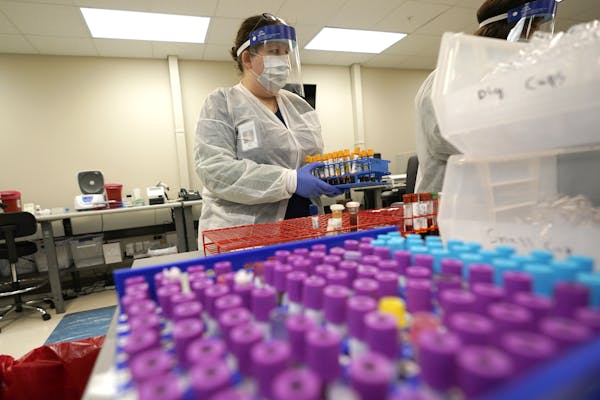As the coronavirus pandemic spreads, we've asked readers what they most want to know about its impact, prevention and treatment. This is an answer to one of those questions. You can find more answers here.
If you suspect you may have already had COVID-19, is there a test that can be done after the illness has passed?
Yes, there is a blood test that looks for signs that someone had been infected by COVID-19. Also known as a serology test, it is not used to diagnose someone with the disease — that is done by taking nasal or oral samples using cotton swabs for a different type of test. Instead, the serology test looks for antibodies, which are proteins in the blood that are produced as part of the body's immune response to infection. These are usually most detectable after someone has recovered from the illness.
The hope is that antibody testing will provide new options for people and public health policymakers. If we can identify those who have COVID-19 immunity, perhaps more people can safely be deployed on the front lines, such as health care, grocery stores, transit drivers, child care and other critical jobs. It would also be valuable information for family caregivers, co-workers and for anyone trying to get back to a normal life.
For public health officials, the antibody testing can be used to help provide estimates on what share of the population could be immune from the new coronavirus. That would inform decisions about when and how to lift stay at home and other restrictions.
Health officials and doctors, however, caution that at this point the antibody tests results do not come with ironclad certainty. That's because we still don't know everything about COVID-19 immunity. And, unfortunately, some tests are not as good as others and some could even be fraudulent, marketed by those who exploit the fear caused by the pandemic.
"We have a lot to learn in terms of how long an immunity to this virus lasts," said Matthew Binnicker, director of the clinical virology lab at Mayo Clinic in Rochester.
"What we don't know yet is how long the antibodies persist and whether they provide strong immunity against the virus."
Exposure to some viruses provides long-term immunity.
"For some diseases like measles, protection is lifelong. For other diseases, protection is limited," said Kris Ehresmann, infectious disease director at the Minnesota Department of Health.
Ehresmann and others are part of a public-private work group that is working on guidelines on how to deploy and use serology tests. Both Mayo Clinic and the University of Minnesota have developed their own antibody tests. As of now, the tests are not widely available.
Public demand is expected to exceed capacity, in part because 80% of COVID-19 infections cause only mild symptoms — leaving many people in limbo wondering whether they were infected.
Private companies are also rolling out antibody tests, but not all of them are approved by the Food and Drug Administration.
"While we have some real high quality tests being developed in the state," said Daniel Huff, assistant commissioner for health protection at the Health Department. "Not all of these serology tests are the same."
Some tests detect the presence of antibodies to coronavirus, but lack the precision to detect the particular coronavirus that causes COVID-19. Different types of coronaviruses caused the SARS outbreak in 2003 and the MERS 2012 outbreak, but they also are responsible for the common cold.
"Some of the lower quality tests will actually show that you had one of these common cold type coronaviruses," Huff said. "There are a lot of, unfortunately, fraudulent tests out there."
Staff writer Jeremy Olson contributed to this report.

Legal Marijuana Now Party fights to keep its major party status before Minnesota Supreme Court
Officials say man shot 2 months ago in vacant downtown Minneapolis triplex was victim of homicide

Official who helped MSHSL on pioneering ventures dies at 89

Buy Nothing meets GoFundMe: How a Eden Prairie website aims to 'revolutionize' philanthropy

